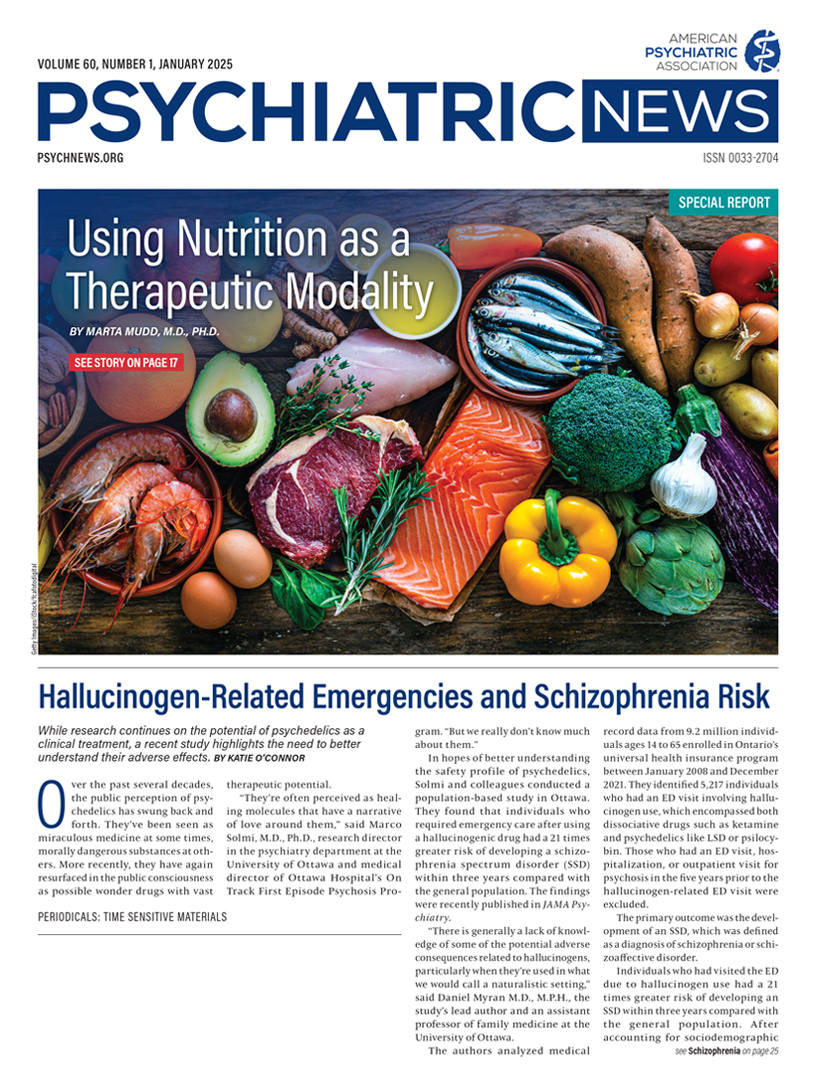Beginning with this issue, Psychiatric News is adding a regular section devoted to consultation-liaison psychiatry. Like other psychiatric subspecialties such as forensic, child and adolescent, geriatric, and addictions, C-L psychiatry is ACGME accredited and requires a one-year fellowship for subspecialty board certification. The clinical focus of C-L psychiatry is primarily on patients with systemic medical and/or surgical illness and comorbid psychiatric illness.
While consultation-liaison psychiatry historically was practiced largely—at times more or less exclusively—at general hospitals and medical centers, in recent years, it has expanded to outpatient clinics devoted to the care of systemic medical illness with significant psychiatric comorbidity. Examples of these models of care include consultation-liaison psychiatrists embedded in HIV, organ transplant, oncology, and neurology outpatient clinics.
Readily and Pragmatically Available
This new section reflects the fact that, as a subspecialty, we would like to be readily and pragmatically available to our psychiatry colleagues when they confront a clinical challenge that bridges the systemic medical-psychiatric “divide” that inherently involves multiple specialty physicians—often with much complexity on both sides of the divide. We want to publish useful guidance for the management of psychiatric illness with significant systemic medical comorbidity; equally important are the systemic medical implications of psychotropic medications and other somatic interventions. We hope that this approach will lead to greater opportunities for collaboration with our psychiatric colleagues.
Indeed, collaboration has always been a core tenet of C-L psychiatry, whose practitioners were among the early adopters of telemedicine technology, initially to support primary care clinics. Similarly, the embedding of consultation-liaison psychiatry outpatient services and the efficiencies of this model were significant factors in the development of embedded behavioral health models, where other mental health clinicians are located in primary care clinics to effectuate a treatment-to-target model for mild to moderate severity psychiatric illness such as generalized anxiety disorder and non-psychotic/non-melancholic major depressive disorder.
This model includes mental health clinician collaboration with primary care physicians, physician assistants, and nurse practitioners supported by a C-L psychiatrist for overall outcomes review, caseload management, and direct consultation for patients with suboptimal response to routine care. Such models have proved to be successful and are ever more commonly adopted, especially by large health care systems with significant primary care operations.
In our hospital-based practices, C-L psychiatrists routinely manage substance abuse/intoxication/withdrawal states, emergency department presentations, and ward and ICU cases. As such, the illnesses we manage are heavily skewed toward neurocognitive disorders (e.g., delirium, major neurocognitive disorder, and traumatic brain injury), psychiatric illness in the setting of adaptation to illness/injury, and the myriad psychiatric presentations associated with complex systemic illness, including Parkinson’s disease, multiple sclerosis, and systemic lupus erythematosus.
In addition, C-L psychiatrists are clinically current in the various dangerous illness presentations directly attributable to psychotropic medications, such as lithium toxicity, serotonin syndrome, neuroleptic malignant syndrome, and SIADH (syndrome of inappropriate antidiuretic hormone secretion).
Managing Multispecialty Teams
Our plan is for this section to include pragmatic case material reflecting C-L psychiatry, presented in a manner to be accessible to general and other subspecialty psychiatrists, all of whom may occasionally need to see hospital-based consultations. Among other things, we will offer contemporary reviews of medically significant toxicities of psychotropic medications, clinical presentations that are primarily or substantially psychiatric in their phenotypic presentation but nonetheless largely (if not solely) attributable to primary systemic illness, evaluation and management of complex psychiatric comorbidity presenting in a general medical setting, and pragmatic use of neuroimaging and clinical laboratory assessments in patient evaluation.
Our ultimate goal is for other psychiatrists to develop workable collegial relationships with C-L psychiatrists for cases where subspecialty consultation is indicated. Many illnesses commonly seen and managed by C-L psychiatrists are the focus of clinical research, with prominent examples including the diagnosis and multifaceted management of delirium, advances in the clinical diagnosis and management of catatonia, and the complex interplay between psychiatric and other medical illness. Many of these conditions require the involvement of many other medical specialists, so the function and collegial management of multispecialty teams is an important aspect of C-L psychiatry practice.
We welcome submissions of case reports, case series, reviews, and commentaries related to the practice of consultation-liaison psychiatry. We hope that this becomes an interesting and valuable forum for considering the more difficult and challenging clinical cases as we all work to serve our patients. ■
